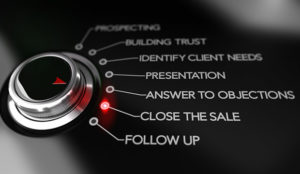For most of my professional life before I became an analyst, I was a sales rep, and my forte was software. Back in the mini-computer era nothing was easier, and then harder, than selling software.
Early on it took almost nothing to sell some basic application development tools. Businesses knew they needed automation and there was relatively little software for them to buy once they’d bought a computer; mini-computer culture was about making your own and then trading, say an AR system for HR.
Whatever. That didn’t last and almost as soon as there was enough professionally developed commercial software the industry tanked. For ten long years corresponding to the long wait for client-server to be available, few organizations bought much other than ERP systems to prepare for end of century and four-digit dates.
The sales profession underwent a significant change in that decade. We went from being free agents doing what we needed to do to sell something (and make a living) to armies of highly regimented soldiers selling by the book. Every organization I worked for in that era implemented a sales methodology — do this, then that, then prepare contracts. Simple, except that it wasn’t. There were too many exceptions.
Enter Sales Force Automation
Then came SFA which collected our data and eventually used it to prepare reports and identify trouble spots in our realities vs. “The Methodology.”
I’ve often thought that at least some of the resistance by salespeople to SFA and CRM generally is a vestige of resisting methodology. What else could it be?
Jim Dickie and Barry Trailor spent decades studying the practices of thousands of sales organizations trying to find best practices. They always found that the sales organizations that performed the best were those that had and used a sales methodology supported by technology. They were always a minority, too. You would have thought that even a whisper campaign would have gotten the message across after that many years, but no.
Being a sales rep is hard, being a rep’s manager is mega-hard, and the whole idea of method or even SFA is hard plus hard. As the great Texas-born novelist (“Semi-Tough”) Dan Jenkins would have said, it’s as hard as coming up with rent and alimony.
So it’s no surprise to me that sales methodology is not exactly a hot topic and never has been. Sales managers and their managers have had to make peace with the reality that they might not be able to get reps to use technology, and my research shows this. But methodology alone or with technology is a more-or-less lost cause.
Fortunately, the technology has improved consistently over the last two decades. Even more fortunately, the leading SFA company was founded by a sales guy. Throughout the years whenever I raised the issue of methodology with Salesforce CEO, Marc Benioff — or his people — there usually was not a coherent answer and sometimes they just changed the subject.
The reason is basic: over the last two decades they’ve worked hard to embed method into the tool without calling it that, and without calling attention to what could be considered a surreptitious effort. Why not? Who cares what you call it so long as it gets the results we all crave — faster process time, larger deals, and better close rates. This includes knowing when to pull the plug on deals forever trending sideways.
Outcome-Based Enablement and Coaching
In lieu of methodology or process, Salesforce and others have established the idea of sales enablement. Salesforce even bought LevelJump to drive the idea home.
Good selling is a matter of providing information and then testing to understand if the customer has absorbed it. If the prospect does not absorb information there’s little chance you’re going to score. Everything else is support and there’s a good deal of support in LevelJump.
The Salesforce/LevelJump approach takes responsibility for following a methodology out of the hands of sales reps who never really wanted it to begin with and places it with the sales manager who becomes a coach and the effective enforcer of the company’s methodology. Though I don’t think you’ll hear that word used.
Enablement means embedding and tracking important milestones, providing content and other materials at the right time, delivering needed training within the application when needed. All of this is in service to generating consistent revenue.
Does it work? I’d have to gather some data to say for sure. Nothing works perfectly when you are trying to influence the behavior of another human, i.e., the buyer.
Anyway, the objective is to change the macro result. So far at least, this kind of built-in assistance at the very least helps to identify when a rep might be getting ahead of events and spending a commission before it’s made. At that point coaching is most valuable and just in time content and guidance can be most useful.
Perhaps that is the end of the whole discussion of technology and method, and the final recognition that selling is a team sport.



























































Social CRM
See all Social CRM